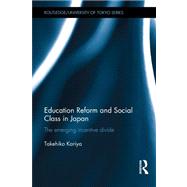- ISBN: 9780415556873 | 0415556872
- Cover: Hardcover
- Copyright: 11/19/2012
Japanese education until the early 1990s was usually commended for achieving outstanding results in global comparison. Nonetheless, this success has always been looked upon with suspicion, and educational reforms aimed at fostering "creativity" and "individuality" came to be called for. Far-ranging experiments aimed at creating a new education were embarked upon. But what effects did the educational reforms carried through in Japan have? Did these reforms achieve the results that were expected of them? Or did they produce outcomes that were not intended instead? And how did such unintended outcomes relate to the structural changes characterizing contemporary Japan? The present study demonstrates from a sociological point of view and by way of empirical analysis, that these educational reforms constituted one of the main factors causing profound changes in the society of post-war Japan. Its main focus is on the spread of inequality in Japanese society as an "unintended outcome" to which the educational reforms ended up contributing. It does not only show that inequality in educational attainment has grown, but also demonstrates that differing mechanisms have emerged with regard to incentives to study, depending on the students#xE2;#xAC;" social origins. By empirically establishing that the reforms ended up inviting this ironic result, the present study seeks to elucidate the causes of recent changes in Japanese society and to critically reassess problematic features of recent educational policy. This book will be of interest to students and scholars in the fields of Asian studies, Japanese studies, education, sociology and social policy. It won the first Osaragi Jiro Prize for Commentary sponsored by the Asahi Shinbun in 2001.







